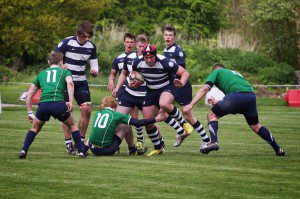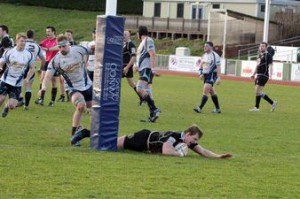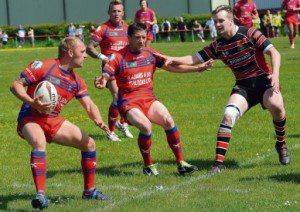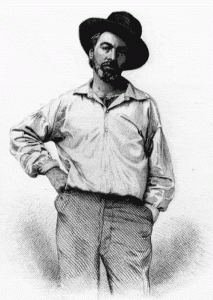 PHILADELPHIA, PA – The summer after I graduated college, I moved to Boston and started playing with the Old Gold Rugby Football Club. Because it was the summer, the focus was on 7s, and a lot of the club’s regular A-side players were in vacation mode. My first chance to play with the club came at the Acton 10s, the club’s own tournament. For this tournament, even the guys in vacation mode turned out.
PHILADELPHIA, PA – The summer after I graduated college, I moved to Boston and started playing with the Old Gold Rugby Football Club. Because it was the summer, the focus was on 7s, and a lot of the club’s regular A-side players were in vacation mode. My first chance to play with the club came at the Acton 10s, the club’s own tournament. For this tournament, even the guys in vacation mode turned out.
On that summer Saturday, I was playing with the second side. I was just meeting quite a few of these guys for the first time. One image remains fixed. I had been carrying water for the first side during a game on the far field. When the game ended, I looked and saw Mike Rooney just past the touch line. With his shortly cropped hair, he was holding his child, putting his face right up to his baby son’s. His nose, which had been broken a few times and looked it, was next to that soft baby face; the dirty, sweaty jersey was next to the clean onesie. There was a guy who looked and filled the part of a real rugby guy, who was also in caring dad mode. I could not resolve what I saw as a conflict. I muttered under my breath, “Poor kid.”

Over the next three years, I got to know Mike and now understand what a fool I was for not understanding the situation. He was one of the club’s most successful players, no matter how you define successful. He played with aggression and didn’t take guff from anyone. While he played with intensity and passion and took pleasure in the physical contest, be was not defining himself by those things alone.
You can take delight in putting in a crunching tackle, and you can take delight in a baby’s giggle. You can feel like a man by earning the respect of your teammates, and you can feel like a man by feeling your child give you a hug.
 Often, boys and young men struggle with what it means to be a masculine man. We no longer have the social network of the early and mid-twentieth century. We are supposed to be chivalrous but not condescending. We are supposed to be strong while still somehow knowing when to be sensitive. My sharing these thoughts does not mean I am confused about the privileges afforded to boys or men.
Often, boys and young men struggle with what it means to be a masculine man. We no longer have the social network of the early and mid-twentieth century. We are supposed to be chivalrous but not condescending. We are supposed to be strong while still somehow knowing when to be sensitive. My sharing these thoughts does not mean I am confused about the privileges afforded to boys or men.
While there are certainly other positive avenues out there, one of the things our men’s rugby clubs do is give young men a chance to be aggressive and physical – and all sorts of other traditional expressions of masculinity – and also be part of a community in which men define themselves by more than just physical accomplishment and aggressiveness. In high school and college, boys play sports with other boys. Adolescent males can, at times, define themselves simply through an action movie kind of mindset. Sports and competition can fuel that. There is no one on these teams to help show that one ought to mature past a one dimensional perspective. At times, the lack of perspective leads to harmful decisions. Poor behavior is sometimes the result of young men trying to assert themselves as men without really knowing what that means. After college, these young men might compete against men of various ages in different sports, but many competitive athletic situations don’t have the same sense of shared accountability and community that a good rugby club has.
 Too often, young men seem to think they need to be on one end of the spectrum or the other and don’t realize that the best men, as Walt Whitman told us, contain multitudes. On the pitch, one can be aggressive, even angry, bold, physical, and everything else a good rugby player is; then the whistle blows, the match ends, and the same man can be nurturing and loving. If being a nurturing parent is antithetical with being masculine, lots of men are pushed away from the positive parenting role they might otherwise take.
Too often, young men seem to think they need to be on one end of the spectrum or the other and don’t realize that the best men, as Walt Whitman told us, contain multitudes. On the pitch, one can be aggressive, even angry, bold, physical, and everything else a good rugby player is; then the whistle blows, the match ends, and the same man can be nurturing and loving. If being a nurturing parent is antithetical with being masculine, lots of men are pushed away from the positive parenting role they might otherwise take.
I remember bringing my oldest son to 7s practice. He would either toddle around and try to pick the ball up and run, or he would sit in his stroller. Some of the college kids training with us would cast a look in his direction, utterly baffled. No doubt, some of them were thinking, “Poor kid.” By then, I was comfortable with my ability to both hustle to the next break down and clear out and hustle back to the stroller when there was a break and make sure my son had the snack he needed.
I’ve received good advice and wisdom from all sorts of places on what it means to be a man and how to be a good dad, but I will remain grateful for rugby and good role models like Mike.
Thanks for your time, Feel free to comment below, please look for and “Like” our Facebook Rugby Wrap Up Page and follow us on Twitter@:RugbyWrapUp, Junoir Blaber, Nick Hall, James Harrington, Jamie Wall, Jaime Loyd, DJ Eberle, Cody Kuxmann, Karen Ritter, Jake Frechette and Declan Yeats, respectively.

